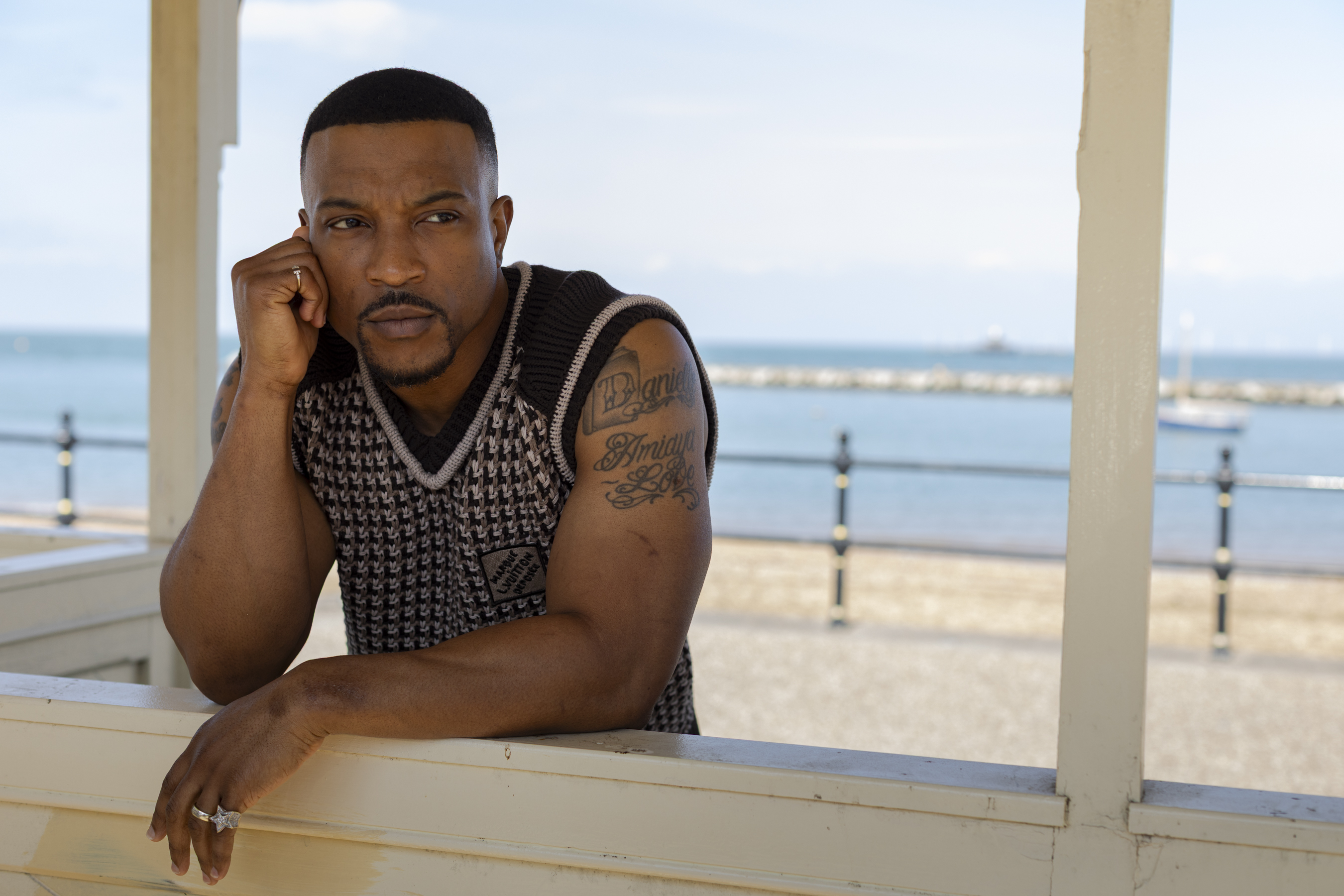Portraits by Luc Coiffait
When Ashley Walters went into rehab for drink and drug addiction, five years ago, he was told to write his life story and read it aloud to the other patients. By the time his turn came around, he’d been up every night, furtively “touching up the writing, doing edits, rewriting”, he says. “I’m such a competitive person that I was, like, ‘I’m gonna write the best life story that anyone in the history of rehab has ever read or written.’” He chuckles at the memory of turning group therapy into a kind of battle, informed, surely, by his past as a member of the UK garage collective So Solid Crew, and his five seasons acting as ruthless drug dealer Dushane in Top Boy. At 42, he was used to playing winners.
Rehab was in a private residential clinic, where other patients didn’t perhaps share the background of a man who had grown up on a council estate in Peckham, become a father in his teens, been in a ground-breaking rap crew who made the front page of newspapers for all the wrong reasons, then served time in juvenile detention for firearm possession. Huge acting success followed, but having eight children from various relationships and becoming a grandfather at the age of 38 had brought other pressures, guilt, situations to run away from. A habit of drinking, of smoking weed, of snorting cocaine had just about been buried from sight throughout, turning him into an ambitious man who would work and get high, work and get high, until it all came crashing down in lockdown. He didn’t tell his colleagues on Top Boy exactly why he needed time off – but it turned out they knew.
“I’m not gonna lie,” he says. “Sometimes I’d hear other people’s life stories in the group sessions and I’d think, I would have liked to have had those problems. Or I’d see people read and break down like blubbering babies and I’d be like, ‘What they crying for? Control yourself! That won’t be me.’ But then it was.”
He is speaking calmly, softly, immaculately groomed and poised, sitting in the foyer of the BFI where he has just screened a preview of a film he has directed, Animol, about life in a young offenders institute and “the power of humanity”. The audience are still streaming out, congratulating him as they go. Having recently played the detective in global Netflix smash hit Adolescence, and with Hollywood on the phone making offers almost as we speak, his career is entering a different league. But he says it wouldn’t have, had he not picked up that pen in the clinic and written down his shame. He’s not sure he'd ever taken the time to really look at his life before. And he didn’t like what he saw.
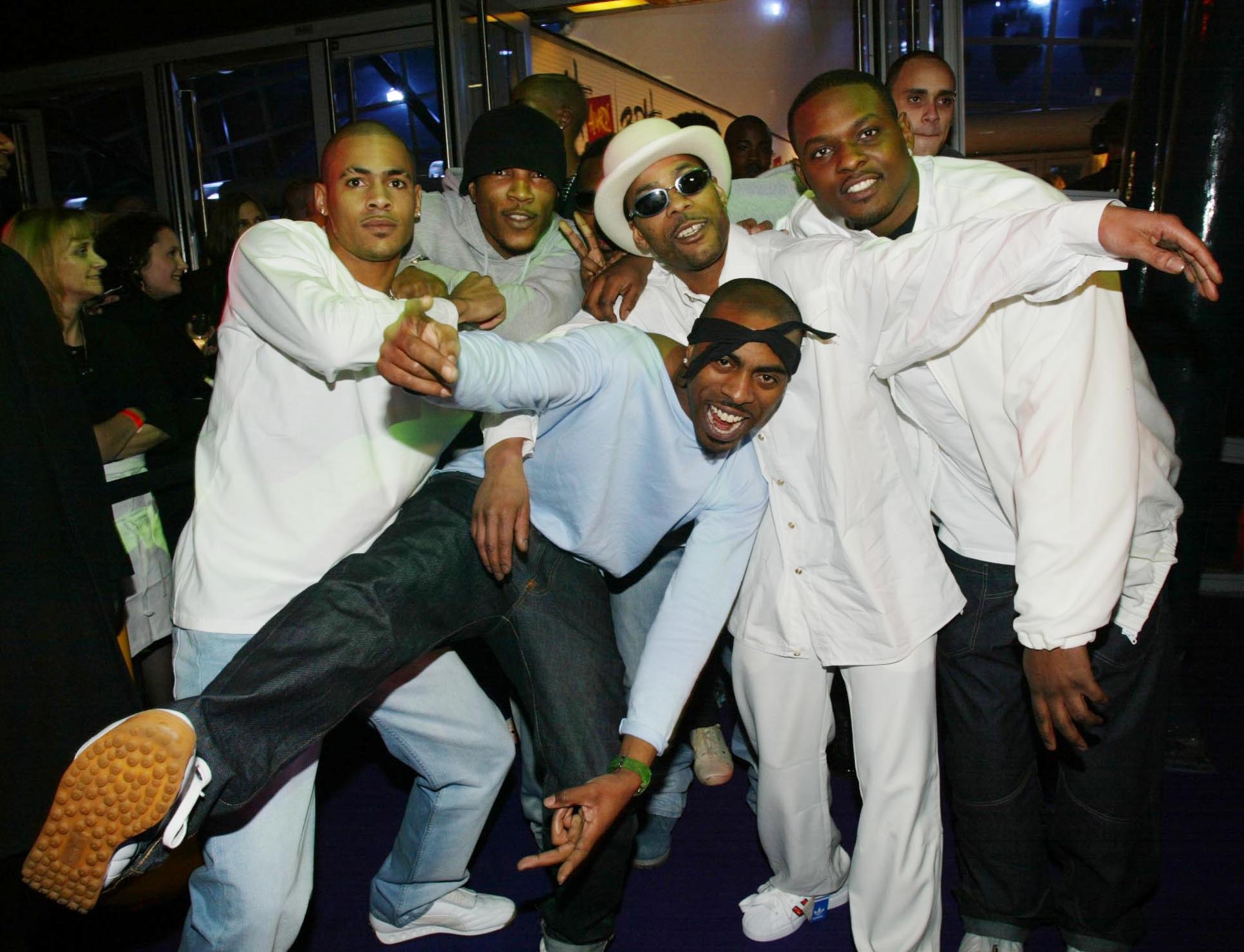
“When I read through the shit that I’d done,” he says, “the person I’d been whilst I’d been drunk, whilst I’d been high, I don’t think I’d taken it in – the accumulation of all these things. Reading it, like, ‘I would hate me. What a twat.’ That hurt, on many levels.”
His ego was bruised by the realisation that, despite his professional success, he had become his own father. On the rare occasions as a kid when he saw his dad, he recalls trying to carry the grown man down the street after he’d been kicked out of a family gathering intoxicated, or ducking down in a stolen car his father was driving so the police couldn’t spot him. Being told his father was “in France” as a code for him being in prison – and he went to France a lot. (It was only while trying to read a letter sent to him from inside that Walters realised his dad was illiterate.)
“I’d become the person that I’d always said I’d never be,” he says. “And then I was that person to my own kids. I was destroying my kids’ lives. Destroying my wife’s confidence for not being the person she needed to be and failing at certain things, but how could she even do those things if she had to take care of me? I was an idiot. An ego-driven kind of fool who felt that he was God. And it took a lot to accept I’d been that person for so long.”
Walters now lives on the Kent coast, with his wife Danielle, an actor who he met on set and initially felt nervous to talk to, and their three kids, who are variously immersed in dance and singing lessons. Louis Theroux interviewed them all at home there a couple of years ago for the BBC, “and I don’t know actually what I was expecting, but I didn’t expect to share as much as I did,” he recalls. Since then, people have approached him so much that he realised he needed to say even more. Hence his memoir, Always Winning, published at the end of this month.

I meet Walters again by the seaside in Herne Bay, on the north coast of Kent, close to where he lives. We’re meant to go for a walk, but people keep recognising him and wanting selfies – politely, he agrees, but it becomes wearying – and we end up sitting in a car. Since Adolescence, people seem confused about whether he’s a drug dealer or the police. He laughs that “people can’t sometimes separate real life from acting”. His ideal day on the coast involves, “getting a coffee at the local coffee shop, picking up my dry cleaning, going to get my nails done, a weekly pedicure, manicure, then a walk on the beach with our dog Max.” The glammed-up bungalow they bought isn’t exactly the house he would have chosen and the cute little French bulldog isn’t the breed he dreamed of either, but Danielle is “the love of my life,” he says, and compromises needed making. I ask if he misses the drama of London and he grins. “That would be a no.”
Newsletters
Choose the newsletters you want to receive
View more
For information about how The Observer protects your data, read our Privacy Policy
Walters is keen to take responsibility for his life now. He wants to stress that his own childhood was also amazing, thanks to his mum. A single parent who worked for the council, she is Jamaican, and was strict with her only child, constantly reminding him that as a Black boy in England he would have to work twice as hard as the white kids to prove himself. He would have liked more affection, but she kept him out of trouble with extra homework, drama lessons at weekends, books. “She did a lot for me through pushing me to read. I say that not for the understanding or articulation of the words, but for the dreaming. Do you know what I mean? Imagination, reading about places I had never been to, and understanding that I could go there. A lot of my mum’s friends were white and middle-class, so I was over their houses a lot, seeing homes I couldn’t imagine living in, to be honest. And those things really gave me a different sort of energy and lust.”
‘I was scared of having to stop, of people seeing the real me’
‘I was scared of having to stop, of people seeing the real me’
He attended Sylvia Young Theatre School and “as a kid my main source of income was doing radio plays – well, I never saw any of that money personally, but I’m sure my mum fed me with it”. He’d miss primary school to travel to studios in Cardiff or Bristol with chaperones, be on BBC radio. Then he appeared in the West End, “and I had my own little Sing Yer Heart Out… stint at the National and then a couple of plays at the Royal Court, upstairs and downstairs”. All of this was kept secret from the tougher lads he was starting to hang out with. He was mortified when someone from Peckham recognised him on a poster for Oliver! at the London Palladium. And they didn’t even know about his tap and ballet-dancing lessons.
But the teenage heart wants what the teenage heart wants, and life got more exciting when trouble and ambition came calling with the same knock. He became fixated on earning a place in So Solid Crew, who were already big on the street but not yet in the charts. He took on the name Asher D, “and kept my acting career separate for many reasons, but the main one, believe it or not, was that at that time, it just wasn’t… I wasn’t proud of it” – the acting – “because I was playing at being a gangsta rapper”.
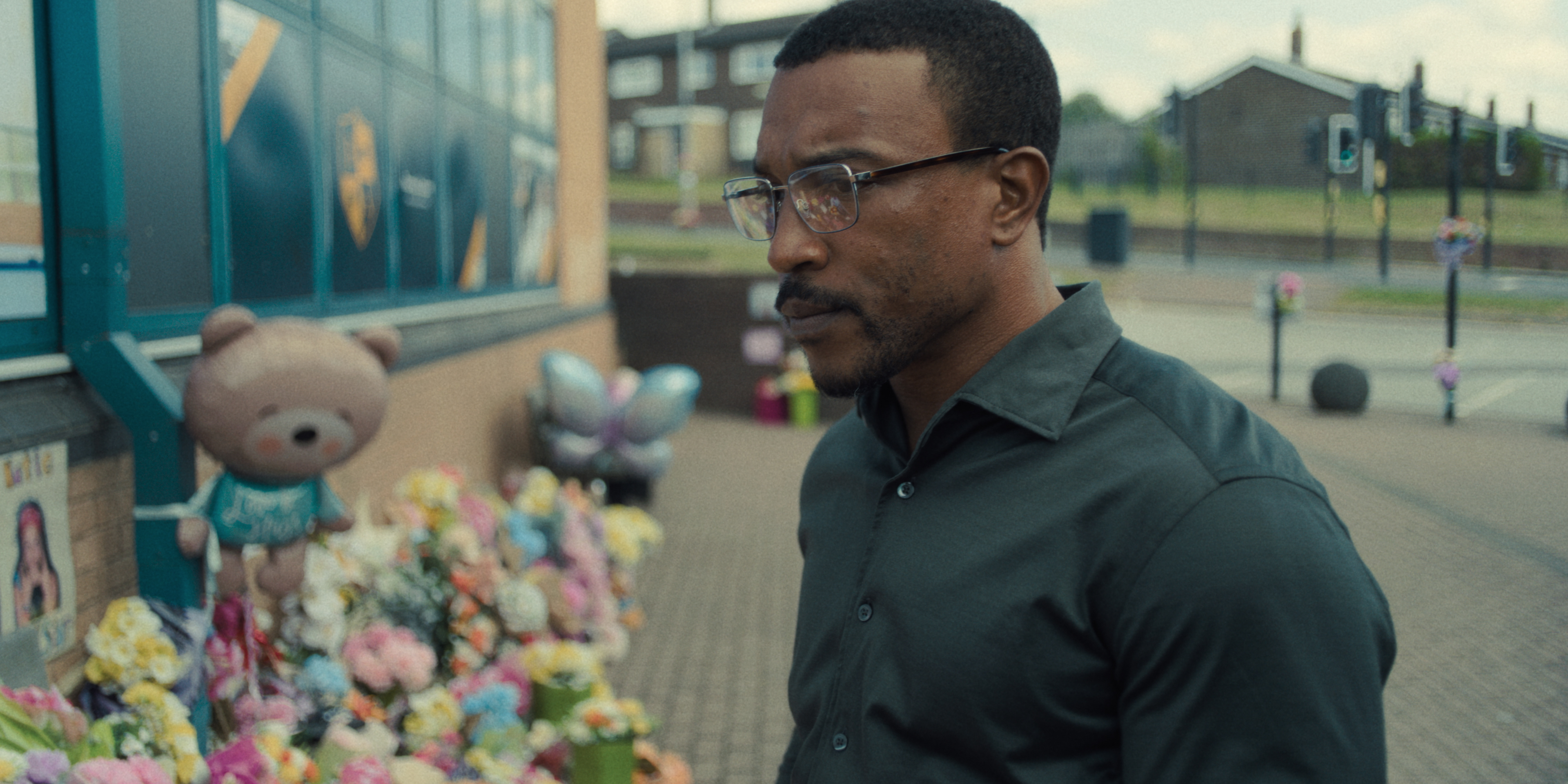
In November 2001, a few months after So Solid’s track 21 Seconds topped the UK charts, they were booked to play the Astoria. Located on the corner of Tottenham Court Road, it was only five miles from the Crew’s base on the Winstanley Estate in Battersea. They had by now achieved mainstream success, which you might think protected them from old foes, but they’d been tipped off that enemies were mobilising that night. “Some of our guys had a past before music where they were involved in… situations that I won’t go into,” he says. “They were having problems with other infamous figures on the street, who were coming to avenge. And I knew I was guilty by association. You could look in everyone’s face and know everyone was shitting themselves about going to this gig.”
So they brought loyal friends and rolled up in an entourage of about 25 Addison Lee taxis that were booked to idle beside the venue. “There may or may not have been at least a gun or two per vehicle.” Walters details the night in his book, which his brother-in-law helped him write. It’s part memoir, part guide to life, with an emphasis on overcoming your fears. But where other self-help books might talk blandly about living bravely, Walters has some rather more terrifying examples – such as what unfolded at the Astoria that night.
The show began peacefully enough, but the “opposition” was soon spotted, right at the front of the crowd, breaking bottles. “Next thing we knew they were rushing the stage. All I saw was darkness. The sound of gunshots popping off. There must have been about a hundred people onstage.” Ashley and his crew scattered, using a side exit to make their getaway, but their waiting cars had vanished. He heard another shot and thought they’d been hit, but his bandmate had shot himself in his groin and fell to the ground writhing in agony. “We had been separated from our personal security, so we were out in the open, exposed, like sitting ducks. We saw another alley and took our chances. We ran down an Oxford Street side road, carrying our injured comrade, knowing our armed enemies were chasing us down,” he writes.
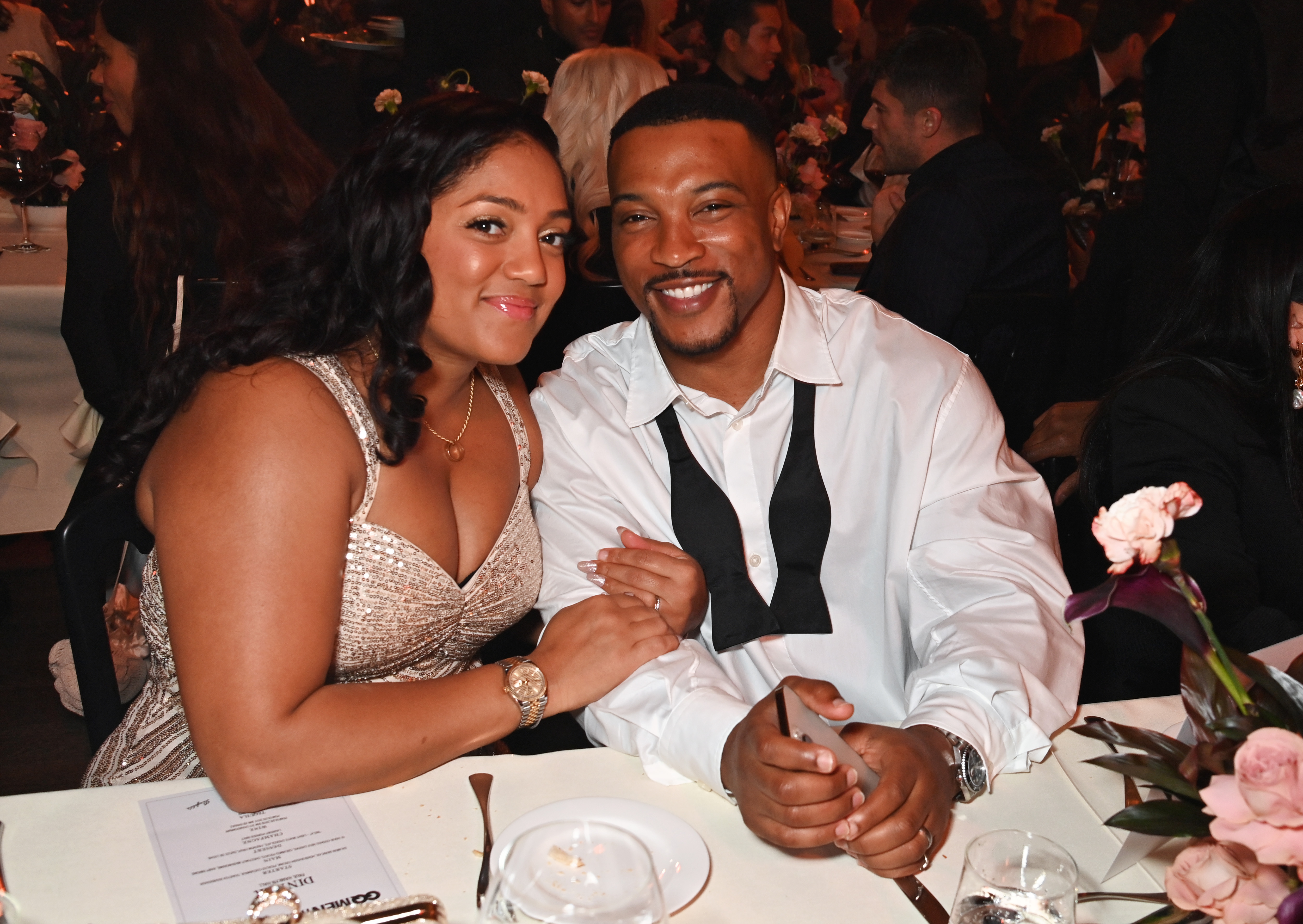
They ended up on a council estate “that looked like it didn’t belong in central London, hiding in some bushes, staying silent while watching our opponents, guns in their hands, running right past us. The slightest sound could have meant our endings. I remember hearing sirens upon sirens. I’d never heard so many at one time.” He says in the book that two people lost their lives; when I check this, it seems those hospitalised may have survived this particular attack, but that people were killed at other So Solid shows.
I remember this from the news: New Labour’s culture minister Kim Howells expressing distaste at the “hateful lyrics of those boasting, macho idiot rappers,” singling out So Solid Crew for a “culture where killing is almost a fashion accessory”. David Blunkett, the Home Secretary, joined in. Reading about it from the band’s own perspective, though – it’s terrifying. Twenty years later, white society does not always allow for young Black men to be scared or trapped or even children.
“But they are scared,” Walters emphasises, remembering his old bandmates, his old self. “A lot of our stuff did sound quite violent – on the surface – but if you delve deeper into the album, there’s a lot of fear in there. A lot of prayers.” They lived at the bottom of a racist infrastructure “and we were crying for help. The main issue I could see in the Crew was there were a lot of broken people. Lost. Disenfranchised. There’s a lot of vulnerability going on, cloaked or disguised in, you know, machismo, in bravado, stuff like that. No one wants to break down that barrier to really see behind it. But I went behind that curtain.”

He was 19 then, already a father of two, had already had a gun pressed to his face outside his home. He still has a scar on his neck from when, at 15, he was stabbed by two white men who left him on the street for dead. So he knew fear, too. But he stresses that it’s what you do with the fear that counts. Do you let it transform you for the worse or for the better? “I mean, I hate to keep on talking about it, but one of those times was when I went to prison – that was all down to fear,” he tells me. He had bought a gun and threatened someone with it. “Acquiring a firearm in the first place was about me being fearful.”
More recently his eldest son [he’s in his 20s] went through a difficult patch and history seemed at risk of repeating itself. Walters realised the important thing was to show him all the other options available in life, advised by his friend the rapper Giggs. “They have to see you as their hero for as long as possible, you have to bring them into your world, that’s what Giggs tries with his own son.” This wasn’t easy, given that Ashley’s son’s formative memories included watching his dad leave to work on a film in South Africa, come back for two days, then leave for another three months “with him chasing my cab, crying, like, ‘Why? Why’d you keep on leaving me?’ I just don’t think I handled all that in the right way. You know, I could have brought them with me more but, actually, I wanted to be isolated. So it was nice to bring him into the fold and he ended up being a really good runner, on set – the actors loved him. He’s worked on a few shows now. So if I keep him around people who are successful and doing well and have nice things, then when his friends start talking about doing stupid things, he’s kind of like, actually, I’ve got better examples, you know. Why would I do that? If I could be with my dad doing this?”
He goes on, “We’ve had a turbulent time, but we’re close at the moment. Having real kind of men-ish conversations – I mean, talking about being dads, he’s got kids. And I feel like even though he hasn’t said it directly, he’s slightly forgiven me. But I’ll be making lifelong amends, in my opinion. It will never stop.”
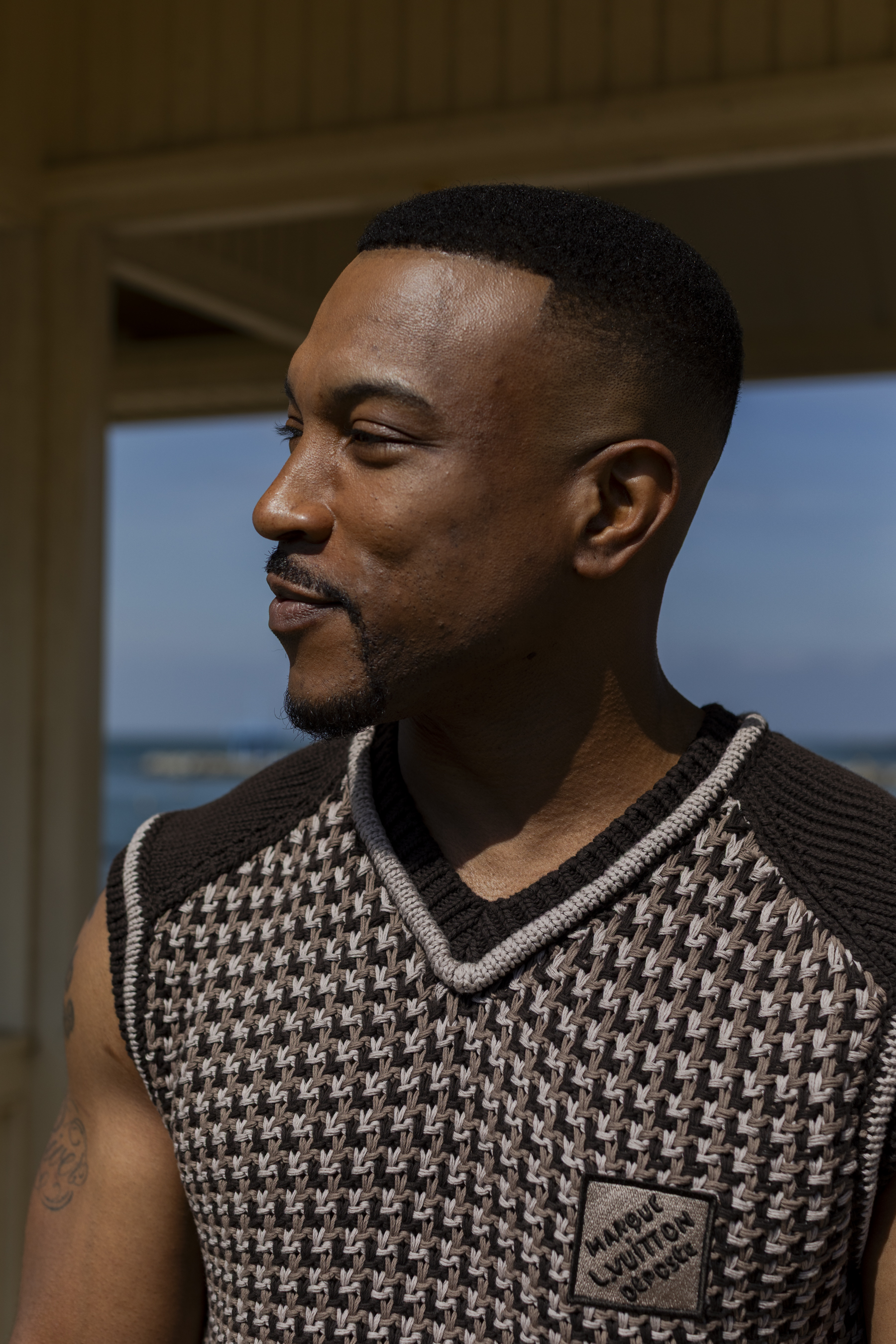
All of this sounds somewhat close to parts of Adolescence, the show about a young white boy accused of murder that became a national conversation, with the prime minister demanding it be shown in schools, while the leader of the opposition, Kemi Badenoch, claimed she hadn’t watched it. “Oh I think she has,” Walters says, with a grin.
In Adolescence he plays a detective who realises during the course of the show that his relationship with his own son has a question mark over it. “I went on a police raid, did all that sort of research after Stephen [Graham] offered me the part, and then it was all thrown out of the window when I was on set because, actually, all I needed to do was to tap into being a dad, which I’ve been for a very long time. You know I’m playing this guy who’s estranged from his child, even though they’re living in the same house. They’re ships passing in the night. And that’s been me for more than a few years, ’cos I was just working all the time.”
Once again, there was something he’d been avoiding.
“The show made me understand that I had been scared of having relationships. I was scared of having to stop, and of people seeing the real me. If you’re always moving, you become a blur to people. I stayed up in Yorkshire to shoot it for six, seven weeks, and getting home changed me. Like, wow, just understanding my relationship with my boys. But my younger kids have had a much better experience, to be fair.” He also believes the show has given parents the confidence to take more control of their families. “I used to go softly-softly because I thought I’d be a hypocrite if I told my kids not to do things. But the show has come at a really good time for parents who were worried what other people would think if they only gave their kid a brick phone or worried they’re going to be the odd one out. I feel like it made it safe for parents to say no, to be old-school. So those things have taken shape in my house as well.”
Walters has had so much on his plate from a young age, I think. I ask if he’s ever felt free. He thinks about it for a moment. “This, now,” he says, smiling, “is probably the freest I’ve ever felt.”
Ashley Walter’s book, Always Winning, is published on 29 May by Transworld at £20
Fashion editor Helen Seamons; skin and grooming by Alexis Day using YSL Beauty; hair by Franklyn using Toppikmen and Babylissuk; fashion assistant Sam Deaman; photographer's assistant Shari Montagnana
Photographs by Dave Hogan/MissionPictures/Getty Images, Netflix, Dave Benett/Getty Images, Ali Painter/Netflix
